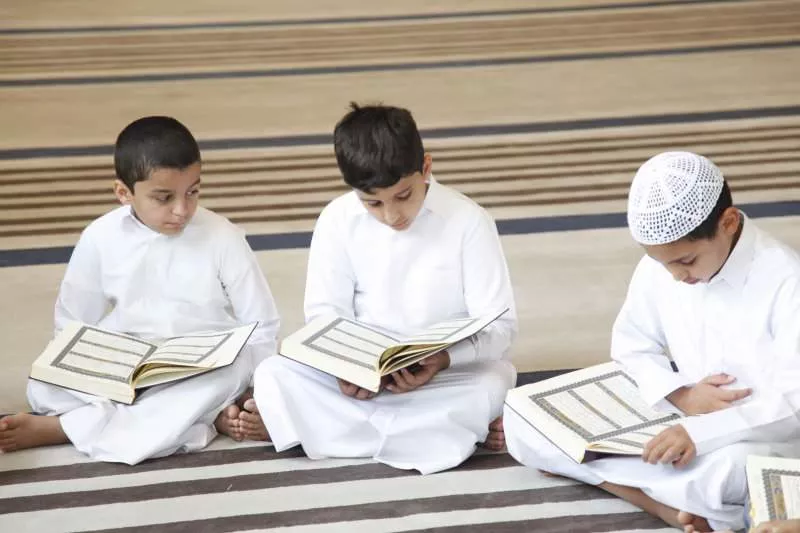If your kid is growing and you are concerned about their Islamic upbringing and the challenges involved, we understand how challenging it is to instill the love of the Deen in their little hearts. However, by using suitable methods and learning how to teach kids about Islam to involve your kids in religious activities, you can enable them to be close to Allah and learn about the religion. Keep scrolling to learn the importance of properly upbringing them, and how to make it fun.
Table of Contents
Teaching Children About Islam:
Teaching Islam to children can be a fun and engaging process when approached creatively. Start by helping them build a connection with Allah through stories of His mercy and blessings. Share inspiring tales of young Sahabah to motivate them, and introduce core Islamic principles, such as the Five Pillars of Islam, through storytelling and interactive methods.
Simple, hands-on activities like Islamic art, using technology for learning apps, and creating a dedicated prayer space at home can make Islamic practices more relatable. Fostering a love for the Quran and teaching daily Duas in a fun way will help them develop a spiritual bond from a young age.
It’s important to lead by example, as children often imitate what they see. Participating in prayers, demonstrating Islamic manners, and celebrating religious events together create a positive learning environment.


How to Teach Islam to Child?
Let’s make teaching Islam to toddlers simple and fun by ditching the formal ways of teaching and opting for non-conventional methods. Keep these tips in mind:
1. Build a Connection with Allah
The foremost step in teaching your kids the Quran and Islamic principles is to build a strong connection with Allah. Frequently talk to your children about Allah’s mercy and love, emphasizing how much He cares for them. Share stories about Allah’s blessings and His creation of the universe for humankind. This helps your children develop a deeper bond with Allah and fosters a desire to learn more about Islam.
2. Tell Stories of Young Sahabah (Companions of the Prophet)
Children are often motivated by examples and stories of success. Share with them the inspiring stories of young sahabah who were companions of the Prophet ﷺ. For instance, Ali Ibn Abi Talib embraced Islam at just 10 years old, Uqba bin Amir was 14, and Jabir bin Abdullah and Zayd bin Harise were both 15. These stories can inspire your children to start their Islamic journey early, just as these young companions did.
3. Make Learning Fun
Engage your children in learning about Islam by incorporating fun and interactive activities. Teaching Islamic studies and Quran memorization to kids in an enjoyable way helps maintain their interest and enthusiasm. Use a variety of teaching methods to make learning a delightful experience for them.
4. Lead by Example
Children often emulate the behavior of their parents more than they follow instructions. If you want your child to pray five times a day or observe Hijab, it’s crucial to practice what you preach. Be a living example of Quranic teachings, as this is one of the most effective ways to impart Islamic values to your children.
5. Teach Them Dua
Dua is a powerful aspect of Islam and a vital practice for true believers. Instill the habit of making Dua in your children from an early age. Help them memorize and use Duas for daily activities, such as traveling, eating, and going to sleep, to nurture their spiritual connection with Allah.
6. Get a Customized Prayer Mat
Children often respond well to personalized items. Invest in a customized prayer mat for your child to make them feel special and responsible for their prayers. Create a dedicated prayer corner for them, complete with a Quran and their prayer mat, to encourage a consistent prayer routine.
7. Buy Children’s Islamic Books
Introduce your children to Islamic books designed for their age group. These books, often filled with colorful illustrations and engaging stories, can capture their interest and make learning about Islam enjoyable. Encourage them to explore these books and learn through visual and textual content.
8. Send Them to Masjids
Encourage your children to attend the Masjid regularly. Although not all places are welcoming to kids, visiting the Masjid provides valuable lessons in discipline and community. Interacting with peers and participating in communal prayers enhances their understanding of Islamic practices.
9. Encourage Islamic Art and Crafts
Incorporate Islamic themes into art and craft activities. Let your children create artwork related to Islamic stories, verses, or symbols. This creative approach reinforces their learning and helps them connect with Islamic teachings in a fun and artistic way.
10. Celebrate Islamic Holidays and Events
Make Islamic holidays and events special for your children by celebrating them with enthusiasm. Organize activities, share stories related to these occasions, and involve your children in the celebrations. This helps them understand the significance of Islamic traditions and fosters a sense of belonging and joy in practicing their faith.
11. Use Technology Wisely
Leverage educational apps and online resources to make learning about Islam interactive and engaging. Choose apps that offer games, lessons and Quranic stories tailored for children. Technology can be a powerful tool to supplement traditional learning methods and keep your children interested in their Islamic education.
12. Create a Reward System
Implement a reward system to recognize and encourage your children’s efforts in learning about Islam. Set small, achievable goals and reward their accomplishments with praise, stickers, or small treats. This positive reinforcement motivates them to continue their learning journey with enthusiasm.
Read more about What Does the Quran Say About Hitting Your Child?
Fun Ways to Teach Islam to Toddlers and Little Kids
When teaching kids about Islam, it’s important to consider not just how to teach them, but also what to teach first. There is a lot to learn about Islam, but building a foundation with these core elements will help nurture a lifelong connection to their faith:
1. Names and Attributes of Allah
If you start with oral information, you may tell them about the 99 Names of Allah and explain their meanings if their first language is not Arabic. Understanding the Names of Allah will help them to understand His unmatched qualities that all Muslims realize. Here is a useful article on how to explain Allah to a child!
2. Pillars of Islam
Every Muslim must know about the 5 pillars of Islam, i.e., Shahadah, Salah or praying, Zakah, Siyam or fasting, and Hajj. What could be a better time to tell them about it than young age? Tell your kids about the pillars of Islam and their significance backed by Surahs and Hadith.
3. Seerah of the Prophet ﷺ
Another tip of how to teach kids about Islam is through Seerah besides the written and oral dua, Surahs and magnificent incidents of Islamic history. Seerah of the Holy Prophet ﷺ is a vital part of Islam. Teach your children about the life of the Prophet ﷺ and how he fought against the cruelty of disbelievers to keep the flag of Islam high. He is indeed the most respectful after Allah, and we believe him to be our last Prophet.
4. Stories of the Prophets
Introduce kids to the stories of other prophets mentioned in the Quran, such as Prophet Adam, Nuh, Mosa, and Isa. These stories are not only engaging but also teach valuable lessons about patience, faith, and obedience to Allah. Use child-friendly language and focus on the morals and virtues demonstrated by these prophets.
5. Understanding Halal and Haram
Teach children the basic concepts of Halal and Haram in Islam. Explain to them in simple terms the importance of choosing Halal foods and practicing good deeds while avoiding Haram actions, like lying or stealing. This foundational understanding will guide them in making righteous choices throughout their lives.
6. Islamic Manners and Etiquette
Children should learn the significance of Islamic manners, such as saying “Bismillah” before eating, “Alhamdulillah” after finishing, and “Assalamualaikum” when greeting others. Teach them to be polite, kind, and respectful to everyone, as good manners are an essential part of a Muslim’s character.
7. Love for the Quran
Encourage kids to develop a love for the Quran by reading short, simple surahs and helping them understand their meanings. Share stories from the Quran, and explain the wisdom and guidance it offers for daily life. Create a fun and engaging environment where learning about the Quran becomes a cherished activity.
8. Importance of Charity and Helping Others
Instill the value of charity by teaching children about the importance of helping those in need. Encourage them to participate in charitable activities, like giving to the poor or helping their neighbors. Explain how small acts of kindness and charity are highly rewarded in Islam and bring blessings from Allah.
Read more about Duties Of Parents Towards Their Child In Islam: Rights, Treatment, And Responsibilities


Discover Engaging Islamic Teachings for Kids with Riwaq Al Quran!
Teaching kids about Islam can feel challenging, but with the right approach and methods, it becomes an enriching experience. At Riwaq Al Quran, we believe in the importance of nurturing a love for Islam from an early age. That’s why we offer our Special Islamic Studies for Kids Course, designed to make learning fun and engaging. Contact us today for a free trial and start your child’s journey in understanding Islam!
We offer several courses such as:
- Online courses for kids.
- Online Quran classes for kids and adults.
- Online Arabic courses
- Online Ijazah courses
- Online Islamic Studies courses.
Here are a sample of our set of Quran Courses that will be helpful for you:
- Online Tafseer Course: Delve into Quranic meanings with our insightful online Tafseer course.
- Noorani Qaida Online: Learn Quranic basics efficiently through our Noorani Qaida online program.
- Online Quran Recitation Course: Enhance Quranic recitation skills through our expert-led online course.
- Online Tajweed Classes: Master Tajweed rules for beautiful Quranic recitation in online classes.
- Quran Memorization Online Course: Memorize the Quran effectively with our specialized online memorization course.
- Online Qirat Course: Explore diverse Qirat styles with our comprehensive online Qirat course.
- Online Quran Classes for Kids: Nurture a love for the Quran in kids through interactive online classes.
Conclusion
Teaching children about Islam is not just about passing down religious knowledge; it’s about fostering a deep, loving connection to their faith that will last a lifetime. By using creative and engaging methods, such as storytelling, interactive activities, and practical examples, you can make Islamic teachings a natural part of your child’s everyday life. Building this foundation from a young age will help them develop a strong sense of identity, purpose, and belonging as they grow.
At Riwaq Al Quran, we are committed to supporting parents in this beautiful journey by providing comprehensive and engaging Islamic studies for kids. Our courses are designed to make learning about Islam enjoyable and meaningful, ensuring that children develop a lasting love for their faith. Start today by enrolling your child in our Special Islamic Studies for Kids Course and watch them grow in knowledge, faith, and character.


































